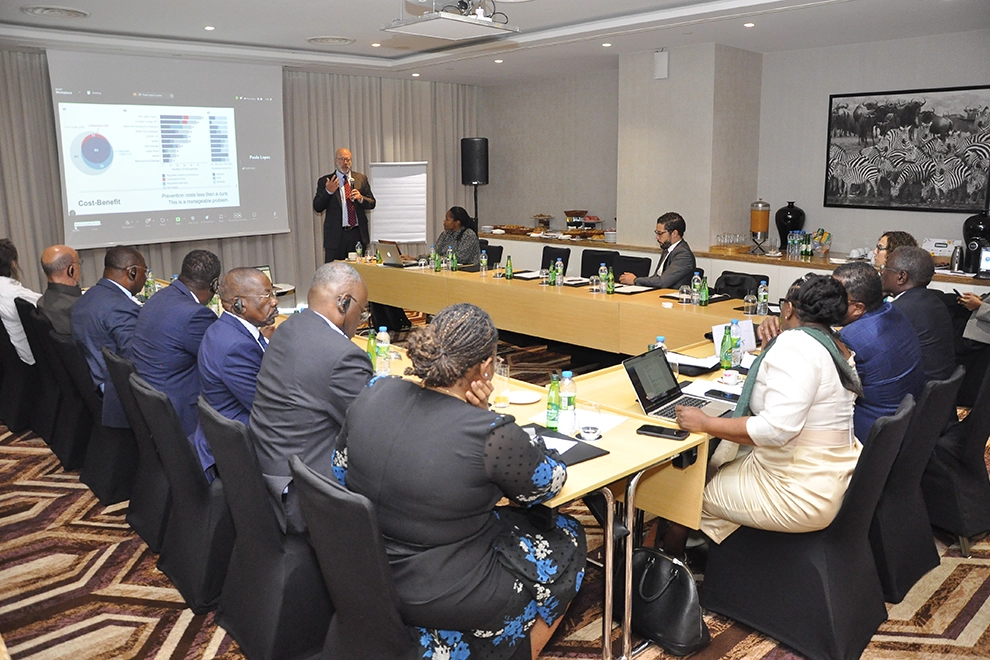The ICCF Group, with support from GIZ and in partnership with the Global Initiative to End Wildlife Crime (EWC) and Legal Atlas (LA), conducted a regional hybrid (in-person and virtual) workshop titled “Preventing Future Zoonotic Pandemics: Strengthening Regional Legal Frameworks and International Cooperation.” Held at the InterContinental Hotel, on May 26, 2025, in Luanda, Angola which included members of the of the Angolan Parliamentary Caucus for Conservation and Sustainable Environment, with members of the Botswana Conservation Parliamentary Caucus and other esteemed guests from Malawi, Tanzania, Namibia, Mozambique, as well as the Chair for the Global Initiative to End Wildlife Crime, John Scanlon, who joined virtually.
The main focus was on a project funded by GIZ to prevent zoonotic pandemics through strengthening regional legal frameworks and international cooperation, with participants reviewing achievements in conservation and sustainable development across African countries. The discussion covered the importance of zoonotic diseases, harmonization of laws between Angola, Botswana, and Zambia, and the need for comprehensive legislation and risk assessments, concluding with a joint statement from parliamentary caucuses emphasizing the importance of addressing wildlife-related zoonotic diseases through collaborative efforts.
Key points, Action Steps and Recommendations
- Parliamentary Conservation Caucuses: Review and circulate the joint statement on strengthening legal frameworks for zoonotic pandemic prevention among their respective caucus members for approval
- Members of Parliament: Review and align national legislation with the newly approved WHO pandemic agreement, focusing on prevention, preparedness, and response
- National Governments: Review existing legal instruments and initiate legislative reforms to address zoonotic risks
- Parliamentary Conservation Caucuses: Implement the One Health approach in legal and policy reforms
- Parliamentary Conservation Caucuses: Establish shared standards and legal benchmarks for preventing future pandemics, including identification of potentially dangerous species in wildlife trade
- Legal Atlas Team: Share detailed data about African Union agreements related to zoonotic diseases with interested meeting participants
- Parliamentary Conservation Caucuses: Develop legislation requiring species-based and place-based risk assessments for wildlife disease monitoring
- Parliamentary Conservation Caucuses: Work on establishing regional laboratory capabilities for rapid disease testing and response
- WWF and Partners: Collaborate with governments to develop strategies that balance wildlife conservation with community needs and disease prevention
- Local Governments: Develop support mechanisms for disadvantaged communities to ensure they have alternative resources
- Regulatory Bodies: Conduct risk assessments to prevent disease importation and exportation between countries
- ICC and Partners: Implement cooperative programs for legislative capacity building and education in member countries
The meeting successfully brought together a multilingual group of participants committed to preventing zoonotic pandemics through stronger legal frameworks and regional cooperation.
The workshop highlighted key conservation and legislative achievements across African countries, emphasizing the urgency of addressing zoonotic disease risks through a One Health approach. Experts and parliamentarians explored diagnostics, cultural considerations, and the need for harmonized laws between Angola, Botswana, and Zambia.
A joint statement affirmed the commitment of parliamentary caucuses to strengthen national legislation, promote international collaboration, and enhance disease prevention strategies. While formal signatures from some countries are pending, the consensus reflects a united regional stance. The meeting concluded with a call for coordinated legislative action, capacity building, and community engagement to tackle the root causes of zoonotic disease transmission and support sustainable development.

 Regional Headquarters
Regional Headquarters